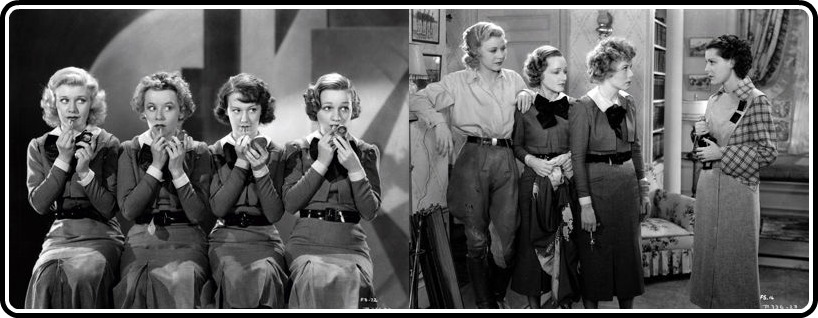
Right up until the end of the Production Code era of filmmaking in 1930’s Hollywood, the various studios churned out stories that pushed the boundaries of transgression for audiences everywhere. These films may seem more than a little tame today, but what these films did for the time cannot be overstated. Women were allowed to have fun, without having to be punished afterwards for it. They could be unashamedly free with their sexuality. These films looked at their promiscuity as a concrete normality; not as something that in any way needed to be fixed. The early thirties in studio filmmaking is a special and thoroughly fun era. In another Warner Archives DVD release, Finishing School, released in 1934, mere months before the Code began to be enforced, is just one example of the many forgotten or overlooked films from that era.
With such an extraordinarily large number of films being released by studios each year, there are bound to be many that slip under the cracks, especially during this time period. Finishing School may not be a classic by any means, but it is more than watchable; a winning mix of good frothy fun and surprisingly thoughtful if relatively simplistic statements on the hypocrisy of reputation. Frances Dee plays Virginia, a young woman newly enrolled at the upper class Crockett Hall by her inattentive mother (Billie Burke). She soon sheds her earnest demeanor when she meets Pony (Ginger Rogers), who tells her that they can do what they please, as long as they do not get caught. This is true to a degree, and is a large part of the film’s statement on these finishing schools.
Reputation is what matters; Virginia can do what she wants, as long as the school takes no slack for it. It is a giant hypocrisy and there are moments throughout the film that highlight this. After a failed drunken night of debauchery, Virginia meets Mac (Bruce Cabot), a waiter at the hotel she and Pony are staying at during their party filled weekend. Mac defends her from unwanted advances from another male and they strike up a connection. It turns out he works at the hotel so he can make money while he interns at a children’s hospital.
At first, Frances Dee comes off as a pretty but vapid presence. As the film continues, her personality emerges and it is delightful. At the start, Virginia seems like the young innocent archetype. This is not the case and thankfully her character does not fit into the assumptions we immediately have of her. She is inexperienced to be sure, but she is smart, level-headed and happens to be up for trying anything at least once. She does not truly get in over her head and suffer for her bad decision-making. Her troubles mainly stem from the school’s attempts to keep her and Mac separated and not from the consequences of her own actions.
Ginger Rogers, in my favorite era of hers, brings the most energy to the film; something is admittedly lacking whenever she is not on-screen. Bruce Cabot’s non-existent personality surprises with moments of droll humor that usually take place in odd solitary onscreen moments. Billie Burke, truly an underrated comedienne, makes the most of the little time she is on-screen in her well established snobbish and flighty persona. Beulah Bondi, who many will remember for her heartbreaking performance in Make Way for Tomorrow, has a supporting role here in one of her first films.
The last third of the film drops the ball. Once Virginia and Mac spend the night together and it is clear that Virginia is anxious about something (it is not hard to figure out what that may be), Mac stops responding to her. In fact, Miss Van Alstyne (Beulah Bondi) has been intercepting their correspondence. The main conflict is that Virginia is not getting these letters. Since this is depicted with scenes of her not getting letters and scenes of her being confused about not getting letters, suffice to say it quickly becomes uninteresting. It does not help that Rogers all but disappears from the film during a large chunk of this time. The film also may be brave in a lot of ways, so it is also disappointing that Mac being a waiter had to be redeemed by the fact that he is actually an intern at a children’s hospital.
Finishing School was co-directed and co-written by a woman named Wanda Tuchock. In an era where female voices were even less represented than they are today, having a woman at the helm of this story, even in a studio era capacity where having a ‘vision’ was not an end goal, cannot be taken for granted. This is a film, like many Pre-Code stories, where girls are allowed to have fun with irreverence rarely if ever found once the Code was enforced. The film sympathizes with them and roots for their freedom. What’s more, Virginia becomes pregnant, out-of-wedlock, with the man she ends up with in the end! There is no nefarious male who knocks her up, forcing her to realize the mistakes of her actions. There is no miscarriage, no breakup and no regret. This is a great example of the worth embedded in the Warner Archives DVD Collection. The films they release may not always be great, but they are films which were virtually unavailable until now. This is not one of the best Pre-Codes out there, but it is an underrated film that is certainly a must for any Pre-Code fans.


